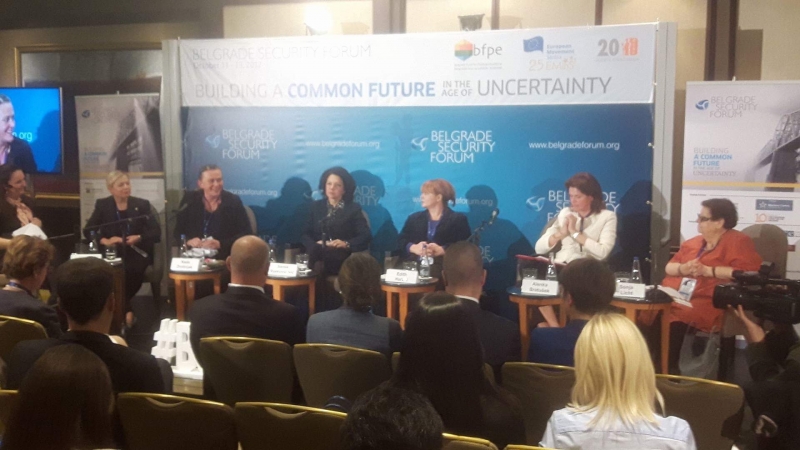Chairperson of the Gender Equality Committee Ms Nada Drobnjak took part in the Seventh Belgrade Security Forum “Building a common future in the age of uncertainty”, which took place in Belgrade, from 11 to 13 October 2017.
The forum was traditionally opened with an academic gathering under the title “The EU as a Global Crisis Manager“, which directed dialogue of the young and promising researchers to the role of the EU in crisis management, examining to what extent its civil capacities were coordinated and their influence visible.
During the three-day work, they exchanged opinions on the current security issues among decision-makers, representatives of security institutions, academic community, and civil society from the Balkans, but also other parts of Europe and the world.
Central topics of the gathering were the future of the European Union and European perspective of the Balkans, responses to the growing inequality and increasingly present populism.
Chairperson of the Gender Equality Committee Ms Nada Drobnjak spoke during the session “Women of the Balkans for New Politics” (in partnership with the OSCE) within the panel titled “Challenging Inequality: Ways Forward”. Speakers within this panel were: Ms Alenka Bratušek, former Prime Minister of Slovenia, Ms Sanda Rašković Ivić, MP and former President of the Democratic Party of Serbia, Ms Edith Harxhi, Executive Director of the Albanian Policy Center, and Ms Vildana Jackman, activist of the CURE Foundation.
The speakers at the gathering were: President of Serbia Mr Aleksandar Vučić, Prime Minister of Serbia Ms Ana Brnabić, Director-General for European Neighbourhood Policy and Enlargement Negotiations Mr Christian Danielsson, Deputy Secretary General of NATO Ms Rose Gottemoeller, ministers of foreign affairs of Serbia and Bosnia and Herzegovina, and other significant names of regional and international political and diplomatic scene, as well as promising researchers.
The gathering was attended by 700 participants, including more than 120 speakers.
Among other things, they discussed migration management, economic influences, soft power, as well as phenomenon of post-truth and proxy wars, relations between religion and security, e-government, influence of women on the Balkans’ politics, as well as the so-called Millennials.
The Belgrade Security Forum was launched in 2011 as a result of initiative of three organisations of civil society: Belgrade Fund for Political Excellence, European Movement in Serbia, and Belgrade Centre for Security Policy.












